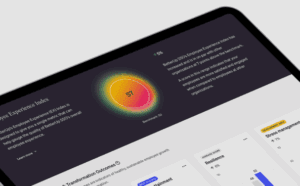Home / Blog / Generative Engine Optimization (GEO) Agency vs. SEO Agency
AI seo
Generative Engine Optimization (GEO) Agency vs. SEO Agency
Published: September 23, 2025
Share on LinkedIn Share on Twitter Share on Facebook Click to print Click to copy url

Contents Overview
A Generative Engine Optimization (GEO) agency focuses on helping brands appear inside AI-driven search results, like Google AI Overviews, AI Mode, Perplexity, and ChatGPT, by optimizing for how large language models capture, ground, and cite content. A traditional SEO agency, on the other hand, works to improve visibility in Google’s SERPs through keywords, backlinks, and technical enhancements. The key difference is that while SEO aims to rank pages, Generative Engine Optimization (GEO) aims to ensure content is referenced and cited directly within AI-generated answers. Generative Engine Optimization (GEO) agencies are groups of experts who know how these new search engines index, classify, rank, and cite pages so that brands can be optimized to meet customers in the buying journey.
Key Takeaways
- What is a GEO Agency? A Generative Engine Optimization (GEO) agency specializes in making brands visible, cited, and grounded inside AI-driven search experiences like Google AI Overviews, AI Mode, Bing Copilot, and ChatGPT. Rather than focusing solely on SERP rankings, GEO agencies optimize for how large language models (LLMs) capture and surface knowledge.
- Key Differences vs. Traditional SEO Agencies: Traditional SEO agencies optimize for SERPs through keywords, backlinks, and technical fixes. GEO agencies, by contrast, focus on passage-level optimization, fact density, statistics, and authoritative citations—strategies proven by GEO-bench research to increase inclusion in AI responses. GEO also introduces new workflows like prompt research, share-of-voice tracking, and AI attribution modeling that go beyond rank tracking.
- What Strategies Does a GEO Agency Execute? Generative Engine Optimization (GEO) agencies combine technical SEO foundations with new practices such as question research, on-page fact-density optimization, data feed audits, off-page reputation building, and AI visibility measurement to ensure brands are not just ranking, but actively included and cited within generative search answers.
Overview: Generative Engine Optimization (GEO) Agency vs. Traditional SEO Agency
Here are the key differences between a Generative Engine Optimization (GEO) agency and a traditional SEO agency:
| Category | Traditional SEO Agency | Generative Engine Optimization (GEO) Agency |
|---|---|---|
| Ranking Focus | Optimizes for Google SERPs using keywords, backlinks, and technical SEO. | Optimizes for AI-driven systems (Google AI Overviews, AI Mode, ChatGPT) that ground, re-rank, and cite passages of content. |
| Content Evaluation Factors | Keyword density, link authority, on-page structure. | Passage-level clarity, authority, fact-density, and information gain. High-performing GEO methods include Quotation Addition (+41% Position-Adjusted Word Count) and Statistics Addition (+28% Subjective Impression). |
| Workflows | Keyword research, technical audits, rank tracking, link acquisition. | Prompt & Question Research, custom share-of-voice tracking, and AI attribution modeling (measuring brand citations inside AI responses). |
| Content Strategy | Create keyword-targeted blog posts, landing pages, and pillar pages. | Passage-level optimization for factual density, unique insights, and semantic coverage to improve grounding and inclusion in generative answers. |
| Off-Page Signals | Focus on backlinks, digital PR, and domain authority. | Build subject-level reputation through third-party citations, structured data distribution, and off-page authority that LLMs can ground to. |
| Measurement & KPIs | SERP rankings, organic traffic, backlinks, conversions. | AI Visibility KPIs: brand mentions in AI answers, passage-level inclusion, authority weighting in generative search outputs, and conversion attribution from AI sources. |
Want to work with us? Learn more about Generative Engine Optimization (GEO) services.
1. Understanding How Each Search Engine Ranks Content
A Traditional SEO agency focuses on optimizing for Google’s SERPs—technical fixes, keyword targeting, and building backlinks remain the foundation. A GEO agency, by contrast, optimizes for AI-driven search systems like Google AI Overviews, AI Mode, and ChatGPT. These engines don’t just rank pages by links and keywords; they ground, re-rank, and cite passages of content based on clarity, authority, and factual density.
Recent GEO-bench research shows that outdated methods like keyword stuffing perform poorly, scoring only marginally above baseline. By contrast, high-performing GEO methods such as Quotation Addition (+41% Position-Adjusted Word Count) and Statistics Addition (+28% Subjective Impression) demonstrate that evidence-rich, authoritative, and well-cited content is what AI engines favor when deciding what to include in answers.
2. Workflows and Measurement
Traditional SEO workflows emphasize keyword research, link acquisition, and rank tracking. Generative Engine Optimization (GEO) agencies operate with entirely new playbooks, including:
- Prompt & Question Research: Mapping how ideal customer personas (ICPs) query AI engines, not just search engines.
- Custom Share of Voice Tracking: Measuring how often a brand is cited inside AI-generated responses.
- Attribution Modeling for AI Traffic: Identifying conversions from AI search citations, something Google Analytics and rank trackers don’t natively measure.
This shift reflects the fact that AI-search visibility is about being part of the synthesized response, not just ranking in a list.
3. Building Reputation & Off-Page Signals
While traditional SEO has long relied on backlinks and domain authority (older methods that don’t work in modern search strategies), Generative Engine Optimization (GEO) agencies extend this into subject-level reputation building. AI models rely on grounding strategies: they prefer to cite sources that are authoritative and consistently referenced across the web. A GEO agency may therefore:
- Develop off-page and on-page assets (articles, press, FAQs, guides) around specific subject clusters.
- Encourage third-party citations that reinforce brand authority within an entity space.
- Distribute structured data and statistics to increase the chances of being used as a grounding reference.
These activities strengthen a brand’s likelihood of being cited, quoted, or referenced in generative answers—something backlinks alone cannot achieve.
What a Generative Engine Optimization (GEO) Agency Does
A Generative Engine Optimization (GEO) agency specializes in strategies designed to increase a brand’s visibility, inclusion, and citation inside AI-driven search experiences such as Google AI Overviews, AI Mode, Bing Copilot, Perplexity, and ChatGPT. Unlike traditional SEO, which focuses primarily on SERP rankings, GEO agencies work across technical, content, and reputational layers to optimize for how large language models (LLMs) capture, ground, and surface knowledge.
1. Question Research
GEO agencies begin by mapping customer demand in the language of AI queries. This involves analyzing both first-party and third-party data to uncover how different cohorts of customers phrase questions in natural language. From there, the agency builds a content and asset strategy that ensures the brand’s information is positioned for inclusion inside Search Generative Experience (SGE) answers and other AI-driven responses.
2. On-Page Efforts
Unlike keyword-focused SEO, GEO on-page efforts are tuned to passage-level optimization:
- Fact-Density Optimization: Increasing the number of verifiable insights, statistics, and quotations within content.
- Page Structure Optimization: Ensuring AI crawlers can easily parse entities, sections, and facts.
- Information Gain: Delivering unique perspectives or data points that go beyond what’s already available online.
These techniques make pages more likely to be selected, cited, and grounded inside AI Mode or AI Overview results.
3. Data Feed Optimization
AI search engines increasingly pull from structured data feeds. GEO agencies audit and optimize these feeds to ensure nothing blocks or dilutes brand visibility:
- Merchant product feeds
- Google Business Profiles
- Review aggregators
- News/media feeds
By resolving incomplete or inaccessible feeds, the agency ensures the brand’s structured signals flow cleanly into AI search systems.
4. Off-Page Efforts
To influence how LLMs evaluate authority and reputation, Generative Engine Optimization (GEO) agencies go beyond backlinks:
- Building UGC (user-generated content) momentum.
- Securing media placements around high-value topics.
- Cultivating positive third-party mentions around the demand areas most relevant to the business.
This subject-level reputation building increases the likelihood that the brand is cited as a credible source when AI systems synthesize answers.
5. Measuring AI Inclusion
Finally, GEO agencies provide custom measurement frameworks that track how AI search engines reference the brand. This includes:
- AI log file analysis to see which crawlers are accessing content.
- Visibility tracking tools that monitor brand mentions inside AI answers.
- Custom dashboards with KPIs such as:
- Citation rate (how often the brand is cited)
- Conversation-to-conversion rate (how often AI mentions drive measurable outcomes)
- Share of voice inside generative search ecosystems
This closed-loop measurement allows businesses to see, track, and prove ROI or ROAS from generative engine optimization efforts.
What a Traditional SEO Agency Does
A Traditional SEO agency focuses on helping businesses increase visibility in search engine results pages (SERPs), primarily through keyword optimization, technical enhancements, and authority-building strategies. The ultimate goal is to align pages with search engine ranking signals so they climb higher in Google’s results, driving more organic traffic.
| Category | Traditional SEO Agency | Generative Engine Optimization (GEO) Agency | Overlap / Shared Focus |
|---|---|---|---|
| Ranking Focus | Optimizes for SERPs with keywords, backlinks, technical signals. | Optimizes for AI-driven engines (Google AI Overviews, AI Mode, ChatGPT) that ground, re-rank, and cite passages. | Both require Technical SEO to ensure content can be crawled and indexed by Googlebot, Bingbot, and new AI crawlers for knowledge capture. |
| Content Strategy | Keyword-targeted landing pages, blog posts, topical authority via EEAT. | Passage-level optimization for fact density, information gain, and inclusion in generative answers. | Both prioritize high-quality, trustworthy content to represent brands as authoritative experts. |
| On-Page Efforts | Increase information gain, page quality (PageRank), and EEAT signals. | Optimize passages with statistics, quotations, structured data, and authoritative phrasing. | Both focus on trust signals and user experience to maximize visibility and authority. |
| Off-Page Efforts | Backlink outreach and PR placements to signal domain authority. | Subject-level reputation building with UGC, citations, structured feeds, and third-party mentions. | Both benefit more from brand mentions, brand demand, and subject-matter authority than from raw backlinks. |
| Measurement & KPIs | Keyword rankings, organic traffic, conversions. | AI visibility metrics (citation rate, share of voice in AI answers, AI conversion attribution). | Both align on tracking ROI from organic/AI-driven traffic, proving value of search visibility. |
1. Keyword Planning
At the foundation of SEO is keyword planning—identifying the terms and queries customers use and mapping them to target pages. This creates a structured connection between customer demand in the market and a brand’s web presence. Agencies use tools like Ahrefs, SEMrush, and Google Keyword Planner to identify high-value search terms and build a roadmap for ranking.
2. On-Page Efforts
Traditional SEO agencies improve the relevance and quality of content by optimizing on-page factors such as:
- Information Gain: Ensuring content addresses customer questions with fresh, useful detail.
- Page Quality & Authority: Increasing signals of trust and importance that influence PageRank and similar scoring systems.
- Topical Authority: Reinforcing expertise by publishing clusters of content around key topics.
- EEAT (Experience, Expertise, Authoritativeness, Trustworthiness): Structuring content and author signals so Google associates the brand with reliability and credibility.
3. Off-Page Efforts
While on-page optimization is crucial, many agencies also focus on off-page reputation building. The most common approach is backlink development, achieved through outreach campaigns, digital PR, or partnerships. These inbound links help signal authority and boost rankings.
4. Organic Performance Tracking
SEO success is tracked through performance metrics that tie rankings to business outcomes. Agencies monitor:
- Keyword Rank Positions: Visibility across target search terms.
- Traffic Metrics: Organic visitor growth, impressions, and CTR.
- Conversion Rates: Measuring how well organic traffic translates into leads, sales, or other outcomes.
This structured reporting provides businesses with clear visibility into ROI or ROAS from organic search investments.
Where Traditional SEO and Generative Engine Agencies Overlap
While Traditional SEO and Generative Engine Optimization (GEO) represent two distinct approaches, they share important common ground. Both are ultimately designed to make a brand visible, trusted, and discoverable within search ecosystems—whether in SERPs or AI-generated answers.
1. Technical SEO as the Foundation
Both agency types rely on technical SEO as the bedrock of their work. If pages can’t be crawled, indexed, or read, then optimization efforts are wasted. Traditional search engines depend on Googlebot and Bingbot, while ChatGPT, Perplexity, and other AI-driven engines now deploy their own crawlers designed for knowledge capture. Ensuring that these systems can access, parse, and interpret site content is a shared prerequisite.
Curious on what those AI crawlers are? Read our LLM SEO guide.
2. On-Page Quality and Trust Signals
Both traditional SEO and Generative Engine Optimization (GEO) agencies emphasize on-page optimization to deliver the best possible user experience. This includes:
- Building trust through EEAT (Experience, Expertise, Authoritativeness, Trustworthiness).
- Presenting authoritative, high-quality insights.
- Structuring content for clarity and usability.
Whether a page is being ranked in SERPs or surfaced inside an AI-generated response, trust signals and authority signals remain central to visibility.
3. Scalable Content Creation Over Backlinks
Both agency models recognize that long-term success lies in scaling quality content, not chasing backlinks. Google’s Quality Rater Guidelines show clear alignment of devalued manipulative link schemes. And focus on rewarding clear and helpful pages that help humans get real questions answered.
Instead, authority today comes from:
- Brand mentions across trusted sources.
- Brand demand demonstrated through user interest.
- Association of brand names with subject-matter expertise.
This shift away from backlinks toward entity-based authority means that both traditional SEO and Generative Engine Optimization (GEO) practitioners must focus on building brand presence at scale within relevant conversations.
Common Questions About GEO vs. Traditional SEO
Common questions and answers from our experts:
1. Does traditional SEO even matter anymore alongside GEO?
Yes. Traditional SEO remains the benchmark requirement before you can succeed with GEO. Without strong technical SEO—such as ensuring non-blocking JavaScript, crawlable site architecture, and accessible sitemaps—neither Google nor AI crawlers can capture your content. Additionally, not all users are searching via AI systems yet. While adoption of Search Generative Experience (SGE) and AI-driven search is growing, SERPs still represent a major share of discoverability and demand. Neglecting them would leave significant opportunity on the table.
2. If I just do GEO, won’t SEO work too?
Yes and no. GEO has such high content quality requirements—fact density, statistics, unique insights, and alignment with natural language questions—that success in GEO often spills over into traditional SEO visibility. For example, if a large enterprise brand is consistently cited and referenced alongside subject-matter experts across the web, its content will naturally meet many of Google’s ranking criteria as well. However, GEO is not a one-size-fits-all replacement. Some businesses will still need deliberate SEO efforts to compete in traditional SERPs while layering GEO strategies on top.
3. How do you measure success in GEO compared to SEO?
Traditional SEO focuses on rankings, traffic, and conversions. Generative Engine Optimization (GEO) adds a new layer: AI visibility metrics, such as citation rate (how often your brand is referenced in generative answers), share of voice inside AI search engines, and conversation-to-conversion rates. GEO agencies often build custom dashboards and log-file tracking to capture these insights. Success is measured not only by traffic but by how often your brand is chosen as a trusted source by AI search systems.
4. When should a business start investing in GEO?
Businesses should begin Generative Engine Optimization (GEO) as soon as they’ve established a baseline of SEO fundamentals: crawlable pages, quality content, and strong technical health. Generative Engine Optimization (GEO) becomes especially valuable for brands in competitive or fast-changing industries, where being cited in AI answers can mean winning or losing a customer at the exact moment of intent. The earlier a brand builds its AI-ready semantic footprint, the more defensible its authority becomes in future search ecosystems.
More on AI search from Go Fish Digital
- How to Find Pages on Your Site That ChatGPT May Be Hallucinating
- OpenAI’s Latest Patents Point Directly to Semantic SEO
- Everything an SEO Should Know About SearchGPT by OpenAI
- How to See When ChatGPT is Quoting Your Content By Analyzing Log Files
- How to Rank in ChatGPT and AI Overviews
- Top Generative Engine Optimization (GEO) Agencies
- What is Generative Engine Optimization (GEO)?
- GEO vs SEO: Differences, Similarities, and More
About Patrick Algrim
MORE TO EXPLORE
Related Insights
More advice and inspiration from our blog
Location-Based Search Results: How Geographic Targeting Changes Google Rankings
A comprehensive study revealing how Google’s location-based algorithm personalizes search results...
Dan Hinckley| October 24, 2025
7 Technical SEO Fixes That Drive Impact Quickly
Learn 7 quick technical SEO tips from canonicals to alt text...
Bella Ruiz| October 23, 2025
Winning When No One Clicks: How eCommerce Brands Compete in Zero-Click Search
Zero-click searches are changing eCommerce SEO. Learn how to stay visible,...
Fiona Walker| October 23, 2025





